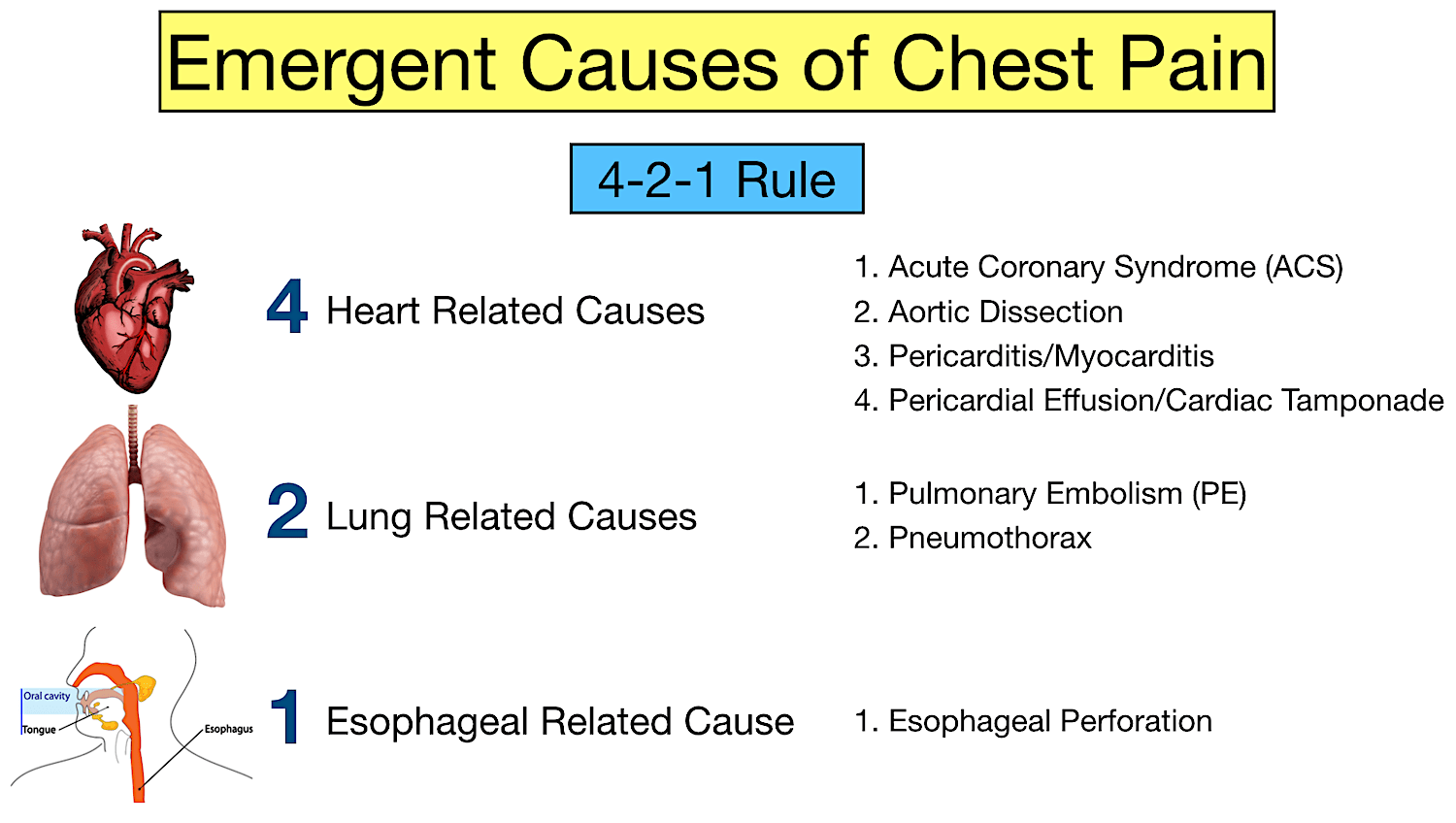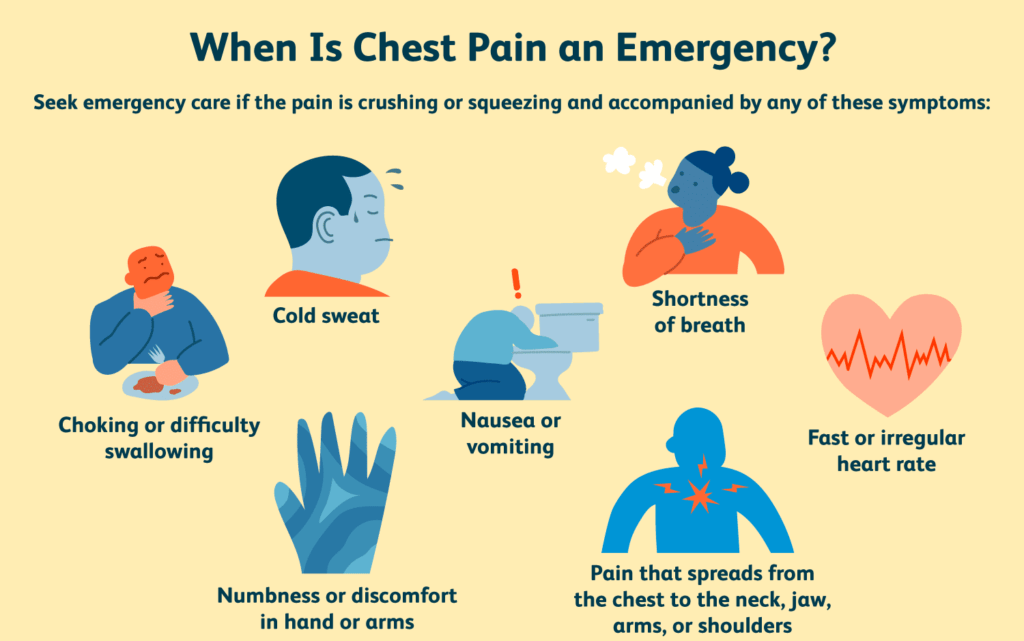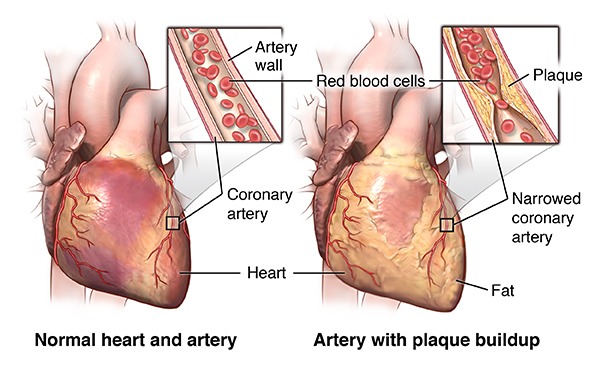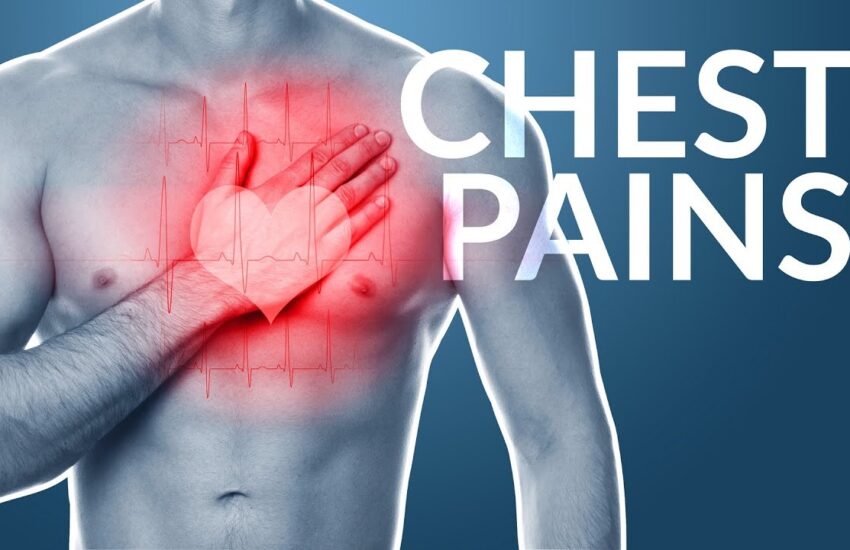Introduction
Pain in the chest is one of the most important emergencies; therefore it is necessary to evaluate chest pain thoroughly. It could be very serious as myocardial infarction (MI) or just muscular pain. Always think first and rule out life threatening conditions such as myocardial infarction, pneumothorax and pulmonary embolism. History is very important, ask the patient whether it is acute pain, recurrent pain, episodic pain, or persistent pain even for days.
Chest Pain Due to Angina Pectoris
Angina pectoris is usually described as the pressure, squeezing, heaviness or sensation of constriction in the chest. Angina means discomfort, but it may be described as the aching or burning pain, difficulty in the breathing or even an indigestion. Chest pain due to angina may be typical or atypical:
Typical Chest Pain
- Typical chest pain of stable angina is the pain that develops gradually after meal, during exertion, excitement, frustration, with anger, and other emotional states.
- It is not precipitated by respiratory movements, coughing or position changing.
- Chest pain due to angina usually resolves within 5 to 30 minutes. More prolonged pain shows myocardial ischemia.
- Chest pain of angina usually resolves after rest or within 5 minutes when take sublingual nitroglycerine.
- Angina typically occurs in the region of retrosternal, anteriorly across the mid-thorax. It may radiate in the inter-scapular region, shoulders, arms, teeth, or abdomen.
- All these features of the pain represent the ischemic pain due to stable angina, while the pain of the unstable angina occurs at the rest, may be atypical and less responsive to nitroglycerine.
Atypical Chest Pain
Atypical chest pain may be due to the ischemic heart disease especially unstable angina. Atypical chest pain may present as following:
- Sharp or knife- like pain due to respiratory movements or cough (pleuritic pain).
- Pain which has primary location of discomfort in the lower or middle abdominal region.
- Pain which may be localized at the tip of one finger specially over the left ventricular apex.
- Pain produced with palpation or movement of the chest wall or arms.
- Constant pain that remains for many hours.
- Very short episodes of pain that last a few minutes or few seconds or less.
- Pain which radiates into the lower extremities.
Chest Pain Due to Myocardial Infraction
Pain of myocardial infarction is similar to angina but it is of greater intensity and longer duration. In contrast to stable angina it is not relieved by the rest or the sublingual nitroglycerine. It may be followed by nausea, hypotension and perspiration.

Diagnosis
History: History is the most important, ask about risk factors for Myocardial Infarction such as smoking, diabetes, hypertension, dyslipidemia and genetic factors. Decide the pain is typical or atypical, acute or ongoing pain, persistent or recurrent pain.
ECG: ST segment depression in ECG curve.
Investigation
Following investigations may be considered to identify the cause of chest pain depending on clinical assessment:
- Cardiac enzymes (Troponin T or Troponin 1, CK-MB)
- X- rays of shoulder, spine or rib
- Endoscopy of Upper GI
- Echocardiogram
- Chest X-ray
- CT chest
- ECG
Treatment
The way that chest pain is treated varies depending on what is causing the pain in the first place.
medications:

Medications
The following medications are used for treating some of the most typical causes of chest pain:
Relaxants for The Arteries
Usually administered as a tablet below the tongue, nitroglycerin relaxes the cardiac arteries to facilitate easier blood flow through the constricted areas. Blood vessels can dilate and relax as a result of certain high blood pressure drugs.
Aspirin
You’ll probably be prescribed aspirin if medical professionals believe that your chest pain is caused by a heart condition.
Thrombolytics
Another name for clot-busting medications. You might be given these medications if you are experiencing a heart attack. These function to break up the clot preventing blood flow to the heart muscle.
Thinners of Blood
In the case that a clot develops in an artery leading to your coronary arteries or lungs, you will probably be prescribed medication to stop further clot formation.
Medications that Lower Acid
A medical professional might recommend these medications if stomach acid spilling into the esophagus is the source of the chest pain. They lessen the stomach’s acid production.
Antidepressants
Your doctor may recommend antidepressants if you get panic attacks in order to assist manage your symptoms. It may also be advised to seek talk treatment, including cognitive behavioral treatment.
Surgical And Other Procedures
Additional therapies for a few of the riskiest reasons why people get chest pain include:
Surgical Coronary Artery Bypass.
Through this kind of open cardiac surgery, the obstruction in the heart is circumvented by creating a new blood vessel. The surgeon uses an artery of blood from another part of the body to build the new channel. Learn More About Coronary Artery Bypass Graft

Urgent Surgery For Repairs
An aortic dissection, commonly known as a ruptured aorta, may require emergency cardiac surgery to be repaired. It’s a potentially fatal illness.
Stent placement and Angioplasty
This procedure aids in clearing an obstruction in a heart-related artery. A narrow catheter with an inflation balloon on the other side is inserted by the medical professional into a big blood vessel, typically in the groin. The tube is guided to the obstruction by the provider. The balloon becomes bigger. This makes the artery wider. Along with the tube, the balloon has been inflated and taken out. To maintain the artery open, a tiny wire mesh tube known as a stent is frequently inserted.
Respiratory Reinflation
A healthcare professional may place a tube in your chest to inflate a compressed lung.


Loved this post! So well-written and full of good ideas.